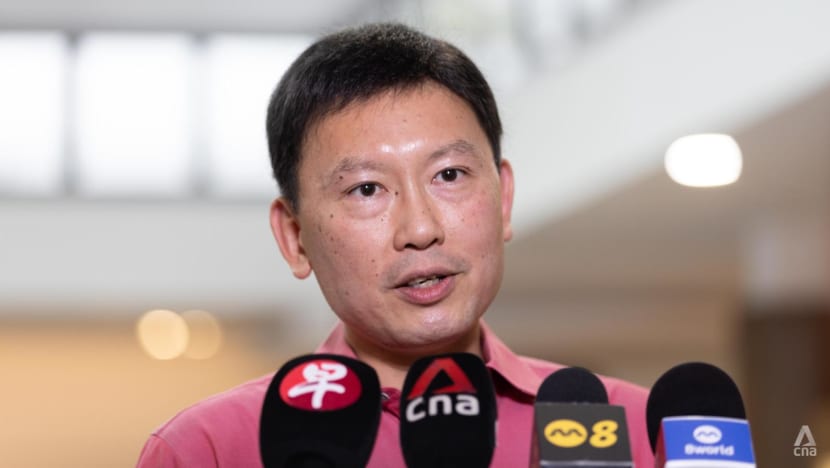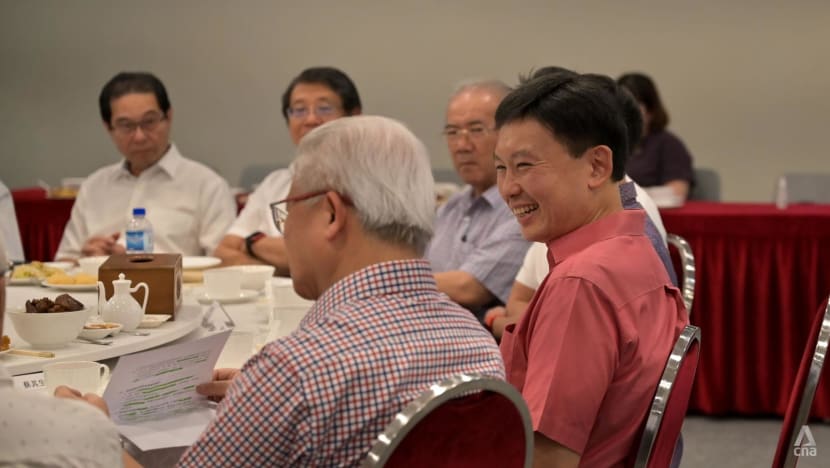Integrating new immigrants is one priority of Chinese Community Liaison Group: Chee Hong Tat
Singaporean identity and culture are not static, and being able to "absorb positive elements" from new immigrants is a plus, said the new chair of the Chinese Community Liaison Group.

Chair of the Chinese Community Liaison Group, National Development Minister Chee Hong Tat speaking to the media at the Singapore Federation of Chinese Clan Associations on Jun 13, 2025. (Photo: CNA/Ili Mansor)

This audio is generated by an AI tool.
SINGAPORE: Integrating new immigrants to foster social cohesion will be a priority of the government's Chinese Community Liaison Group (CCLG) going forward, according to its new chair, National Development Minister Chee Hong Tat.
Singapore's approach in doing so is to share and enlarge the "common space" rather than wanting new immigrants and minorities to assimilate, Mr Chee said on Friday (Jun 13).
"We don't see integration as a reduction, but actually an enhancement, an enlargement and an addition to what we already have," he told reporters after meeting clan leaders at the Singapore Federation of Chinese Clan Associations (SFCCA).
Singaporean identity and culture are not static but evolving, and being able to "absorb positive elements" from new immigrants is a plus for society, said the minister, who was appointed CCLG chair in May, succeeding Law Minister Edwin Tong.
Using Singapore's food scene as an example, Mr Chee noted that in the past, Chinese immigrants to Singapore largely came from the south of China and brought their cuisine with them.
These dishes – like Teochew fishball noodles, Cantonese wanton mee and Hokkien mee – have since become local staples.
"But in more recent times, we also have additions to our food scene, with new items like dao xiao mian, biang biang mian, shou gan mian, and all different kinds of noodles from other parts of China.
"Do they take away our traditional food like wanton mee and Hokkien prawn mee and fishball noodles? No, we continue to retain our traditional food favourites, but now we have additional options that our people can choose from.
"So I think we should see immigration and integration positively, that they don't dilute what we have," said Mr Chee.
"If we are able to maintain a strong sense of identity, if we are able to have that good process of integration, we actually are able to bring on board positive elements and further strengthen our sense of belonging, our identity and our common space."
He noted that immigration is important to augment Singapore's rapidly ageing population.
Elaborating on Singapore's different approach to integration, Mr Chee said: "We want every community to be able to preserve and retain their features that are important to them, the heritage, the traditions, the language, the food.
"But then when we come together as Singaporeans, we enjoy one another's traditions and food and culture, and we enlarge the common space that all of us feel a shared sense of belonging."
FOREIGN INTERFERENCE
Strengthening cohesion within the Chinese community and with other communities is important because this is a "key pillar" of Singapore's social stability and social compact, Mr Chee said.
Asked about foreign interference and the role of clan associations in strengthening Singaporean Chinese identity, he noted that Singapore is a "very open" society in which interference can come from different sources.
"Singapore's politics, Singapore's development, Singapore's destiny must be decided by Singaporeans," he said, adding that there are laws and safeguards in place for this.
"But what is equally important is to develop that social resilience in our community, so that when we come across episodes of foreign interference or developments that happen overseas that may cause an impact on our social cohesion, our community bonds are strong enough to be able to withstand these challenges."
This is an area where the CCLG hopes to work with Chinese community organisations and the media to raise awareness, said Mr Chee.
There are two other priorities CCLG has identified - to attract more young people to join Chinese community organisations and strengthen their leadership pipelines, and to modernise and transform the operations of clan associations.
New immigrants could also form part of the leadership renewal of Chinese community organisations, said Mr Chee.
"Some of them go to school in Singapore, they marry locally born Singaporeans, they set up families here. Some of the guys have done their NS (National Service). They are now working in Singapore, taken up citizenship," he said.
"I think they are very much part of our society, and we should welcome them. We should try to see how we can tap on their strengths and their expertise to contribute back to society, including the Chinese community."

Mr Chee, who was making his introductory visit to CCLG, said he had floated the idea of a leadership development programme that the government, SFCCA and Singapore Chinese Chamber of Commerce & Industry could work on together.
Clan associations must also move with the times and adopt new technologies and methods of working in order to attract more young people, he added.
Speaking to the media in Mandarin, SFCCA president Thomas Chua said Singaporeans expect new immigrants to be contribute to society, and not be a burden.
New immigrants must be able to support themselves and have skills that allow them to help drive Singapore's development. If they do, then Singaporeans should accept them with a positive and inclusive attitude, said Mr Chua, who leads the Singapore Hokkien Huay Kuan.
The CCLG was established in 2000 to improve the government's relationship with Chinese community organisations and enhance cooperation among Chinese community groups.
On Friday, CCLG also announced the 32 members of parliament joining Mr Chee in the group.
Among them are five new office-holders:
- Mr David Neo, Acting Culture, Community and Youth Minister
- Mr Jeffrey Siow, Acting Transport Minister
- Mr Goh Pei Ming, Minister of State for Home Affairs and Social and Family Development
- Ms Jasmin Lau, Minister of State for Digital Development and Information and Education
- Ms Goh Han Yan, Senior Parliamentary Secretary for Culture, Community and Youth and Sustainability and the Environment


















